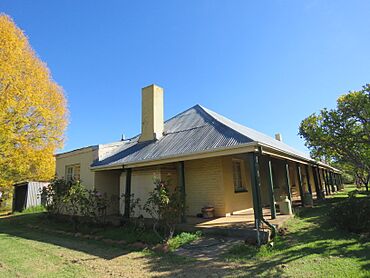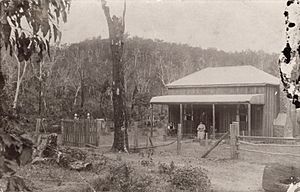Mullalyup, Western Australia facts for kids
Quick facts for kids MullalyupWestern Australia |
|||||||||||||||
|---|---|---|---|---|---|---|---|---|---|---|---|---|---|---|---|

The state heritage listed Blackwood Inn in Mullalyup
|
|||||||||||||||
| Established | 1901 | ||||||||||||||
| Postcode(s) | 6252 | ||||||||||||||
| Elevation | 133 m (436 ft) | ||||||||||||||
| Area | [convert: needs a number] | ||||||||||||||
| Location |
|
||||||||||||||
| LGA(s) | Shire of Donnybrook-Balingup | ||||||||||||||
| State electorate(s) | Warren-Blackwood | ||||||||||||||
| Federal Division(s) | Forrest | ||||||||||||||
|
|||||||||||||||
Mullalyup is a small town located in the South West part of Western Australia. It sits between the towns of Kirup and Balingup on the main South Western Highway. Mullalyup is about 231 kilometers (143 miles) south of Perth, the capital city.
The town is part of the Shire of Donnybrook-Balingup. This area is famous for its beautiful Blackwood River Valley and its many farms.
What's in a Name?
The name Mullalyup comes from a nearby stream called Mullalyup Brook. The explorer John Forrest first wrote down this name in 1866.
The name is from the Noongar language, spoken by the Aboriginal people of this land. It seems to mean "nose place." This might be because nose-piercing was a part of special ceremonies for young men in the past.
Mullalyup and the Shire of Donnybrook–Balingup are on the traditional lands of the Wardandi people. They are one of the groups that make up the larger Noongar nation.
Early Days of Mullalyup
The first European settlers in the Mullalyup area were the Coverley family. They bought land near the town and named their farm "Elm Grove."
The very first important building in Mullalyup was the Blackwood Inn. John Coverley built this inn in 1882 for Thomas Maslin. It was a place for travelers to stay.
During the 1890s, Mullalyup became a stop for trains. A railway line was being built from Donnybrook to Bridgetown. Mullalyup was included as a siding, which is a short track where trains can wait or pass.
The official town site was declared in 1901. This meant it was formally recognized as a town.
 | DeHart Hubbard |
 | Wilma Rudolph |
 | Jesse Owens |
 | Jackie Joyner-Kersee |
 | Major Taylor |



